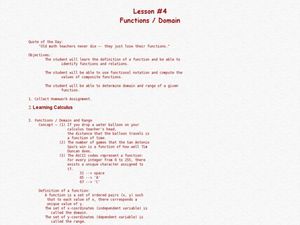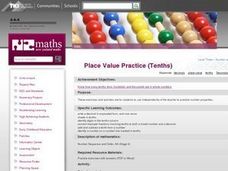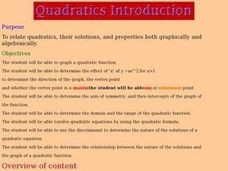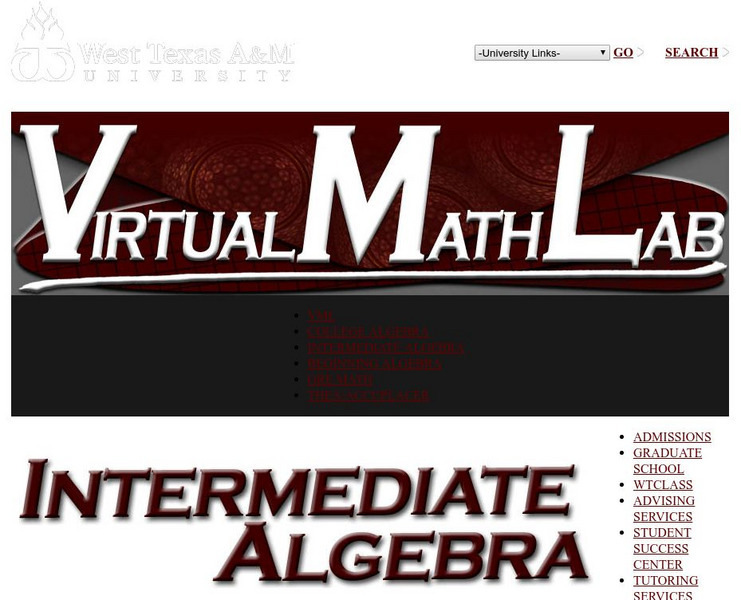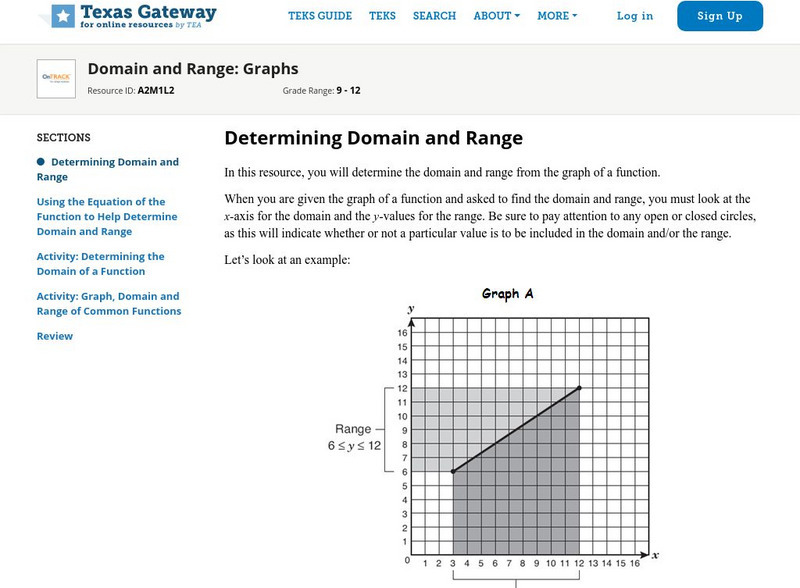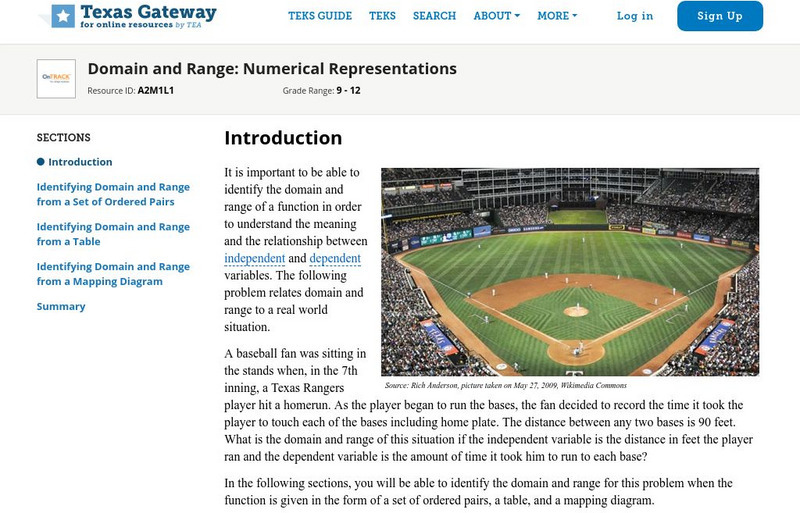Curated OER
Functions / Domain
Students identify and define what a function is and how to identify them and relations. They also use functional notation to compute the values of composite functions. Finally, students determine the domain and range of a given function.
Curated OER
Types of Functions
Students graph step functions (for example, the greatest integer function), and then form the inverse function of given function. They also graph piece-wise defined functions and explain step-by-step the process. Finally, students define...
Curated OER
What's My Function?
Students use input / output tables to help them solve algebraic equations. They use patterns and relations to represent and analyze mathematical situations using algebraic symbols.
Curated OER
Function Machine
Second graders decipher a pattern using input and output. In this functions lesson, 2nd graders use input and output numbers to find a pattern involving addition and subtraction. Students use the pattern they discovered to help solve...
Curated OER
Input- Output Tables
In this math worksheet, students use 20 empty Input/Output tables for any math function where they are applying a rule to different numbers. There are 4 lines on every table and there is an area to write the rule which is being followed.
Curated OER
Input- Output Tables
In this multi-use input-output table worksheet, students fill in 20 tables to determine the rule for a math sequence or pattern. There are no directions given with this worksheet.
Curated OER
Worksheet 2.4/2.5: MT-A141 PreCalculus
In this precalculus worksheet, students use their graphing calculator to graph the domain and range of given terms. They write parametric equations and identify the coordinates of the points on the relation given certain terms.
Curated OER
MT-A141 PreCalculus: Worksheet 5.1
In this precalculus worksheet, students evaluate and graph given functions. They identify the domain and asymptote of each equation. There are two multi-step problems to this worksheet.
Curated OER
Understanding URLs
Ninth graders explore the different domain suffixes in the web site address, how to find the author or sponsor of a page to determine authority and accuracy. They determine how currency of a page. Students enter the lab, log onto...
Curated OER
Place Value Practice (Tenths)
Students practice strategies solving problems with basic facts, framework, domain and early additive part-whole. They recall the compatible numbers to ten, solve problems with small numbers using a part-whole strategy and recall ten and...
Curated OER
Patterns, Relations, and Functions: Lesson 7: Input/ Output Tables
Fourth graders determine how to complete input/output tables. They express rules for input/output or function tables. They complete a worksheet that it is associated with the instructional activity.
Curated OER
Patterns, Relations, and Functions: Lesson 3: Numerical Patterns
Fourth graders extend and continue numerical patterns using function or input/output machines. They finish the increasing patterns using input/output tables, and generalize the rules that apply to the pattern. They complete the...
Curated OER
Quadratics Introduction
Students investigate quadratic functions graphically and algebraically.
Math Medics
S.o.s. Math: Inverse Functions, No Domain Restrictions
A good S.O.S. Math lesson on inverse functions with examples on inverse functons.
Texas A&M University
Wtamu Virtual Math Lab: Intermediate Algebra
This site is a tutorial for students in algebra 2 or for those who need a refresher. The site has explanations, definitions, examples, practice problems and practice tests are found covering topics such as linear equations, graphing,...
TeachEngineering
Teach Engineering: Club Function
Students explore the definition of a function by playing an interactive game called "Club Function." The goal of the game is to be in the club! With students each assigned to be either a zebra or a rhinoceros, they group themselves...
Texas Education Agency
Texas Gateway: Taxonomy: Major Groups
Do you know that organisms are classified into different categories? This tutorial will show you how organisms are classified into three different groups called domains. Then see how those domains are broken down into kingdoms!
Varsity Tutors
Varsity Tutors: Hotmath: Practice Problems: Relations and Functions
Hotmath provides eighteen practice problems dealing with relations, functions, and their graphs. Each of the practice problems include a step-by-step guide for solving their Algebraic problem.
Varsity Tutors
Varsity Tutors: Hotmath: Practice Problems: Relations and Functions
Hotmath provides 25 practice problems dealing with relations, functions, and their graphs. Each of the practice problems include a step-by-step guide for solving their Algebraic problem.
Math Medics
S.o.s. Math: Inverse Functions
This tutorial contains four lessons on inverse functions (on five pages) including an introduction, inverse functions with no domain restriction, composition of functions, and inverse functions with domain restriction. Includes practice...
Texas Education Agency
Texas Gateway: Determining Reasonable Domains and Ranges (Verbal/graph)
Given a graph and/or verbal description of a situation (both continuous and discrete), the student will identify mathematical domains and ranges and determine reasonable domain and range values for the given situations.
Texas Education Agency
Texas Gateway: Domain and Range: Graphs
Given a function in graph form, identify the domain and range using set notation, interval notation, or a verbal description as appropriate.
Texas Education Agency
Texas Gateway: Domain and Range: Numerical Representations
Given a function in the form of a table, mapping diagram, and/or set of ordered pairs, the student will identify the domain and range using set notation, interval notation, or a verbal description as appropriate.
University of Vienna (Austria)
University of Vienna: Definition Set
Interactive assessment tests understanding of definition sets (ie, sets restricted to a certain domain by rational expressions). After completion, the site returns a score to judge how well the exercises were completed.


